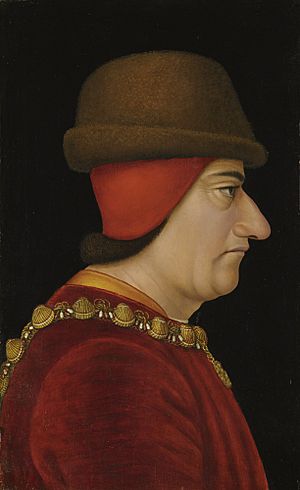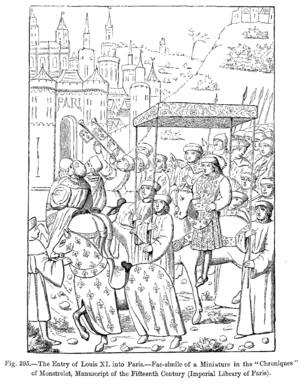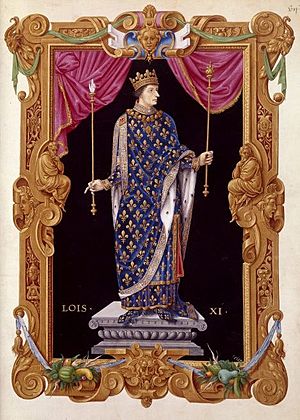Louis XI of France facts for kids
Quick facts for kids Louis XI the Prudent |
|
|---|---|

Louis XI wearing his Order of Saint Michael
|
|
| King of France | |
| Reign | 22 July 1461 − 30 August 1483 |
| Coronation | 15 August 1461, Reims |
| Predecessor | Charles VII |
| Successor | Charles VIII |
| Born | 3 July 1423 Bourges, Berry, France |
| Died | 30 August 1483 (aged 60) Château de Plessis-lez-Tours, France |
| Burial | Notre-Dame de Cléry Basilica, Cléry-Saint-André, near Orléans |
| Spouse |
Charlotte of Savoy
(m. 1451; died 1483) |
| Issue Detail |
Anne, Duchess of Bourbon Joan, Queen of France Charles VIII, King of France |
| House | Valois |
| Father | Charles VII, King of France |
| Mother | Marie of Anjou |
| Religion | Roman Catholic |
Louis XI (born July 3, 1423 – died August 30, 1483) was the King of France from 1461 to 1483. He was also known as the Prudent (French: le Prudent) and the Spider King. Louis was the son of Charles VII of France and Mary of Anjou. He was a member of the House of Valois.
Louis XI is remembered as one of France's most successful kings. He helped unite the country. His 22-year reign was full of clever plans and secrets. This is why people called him "the Spider King." He was very smart and sometimes harsh. Louis worked to reduce the power of the powerful dukes and nobles. This helped make the king's power much stronger.
Louis's love for clever plans made him many enemies. Some of his main rivals were:
- Charles VII, his own father.
- Charles de Valois, Duc de Berry, his brother.
- Charles the Bold, Duke of Burgundy, who became his biggest enemy.
Contents
Louis XI's Early Life and Rise to Power
Where Was Louis XI Born?
Louis was born in Bourges, France, in 1423. At this time, the English controlled northern France. His father, Charles, who was the Dauphin (the heir to the French throne), only ruled the central and southern parts of the country. Louis's grandmother, Yolande of Aragon, was a strong princess. She played a key role in saving France from the English.
Louis did not get along with his father. He thought his father was weak. In 1436, Louis was forced to marry Margaret of Scotland. She was the daughter of King James I of Scotland. This marriage did not improve his relationship with his father.
Did Louis XI Rebel Against His Father?
In 1440, Louis joined an uprising called the Praguerie. This group wanted to control King Charles VII. They hoped to make Louis the Regent, meaning he would rule in his father's place. The uprising failed, and Louis had to give in to the King. Charles VII forgave him. Louis continued his military training. In 1444, he led an army against the Swiss at the Battle of St. Jakob an der Birs. He was very impressed by their fighting skills.
Louis still disliked his father. In 1446, he was sent away from court to his own region, Dauphiné. He was told to bring order there. Even though the King often called for him, Louis and his father never met again. In Dauphiné, Louis ruled almost like a king himself. He continued to make plans against his father. In 1451, Louis, who was 27, married again. His first wife had died in 1445. His second marriage was to the eight-year-old Charlotte of Savoy. He did this without his father's permission. It was a smart move to gain more power.
In 1456, King Charles sent an army to Dauphiné. Louis quickly fled to Burgundy. Duke Philip the Good and his son Charles the Bold gave him a safe place to stay. King Charles was very angry when Philip refused to hand Louis over. Charles warned Philip that he was "giving shelter to a fox who will eat his chickens."
In 1461, Louis heard that his father was dying. He rushed to Reims to be crowned. He wanted to make sure his brother, Charles, Duke of Berry, did not get crowned first.
Louis XI Becomes King of France
How Did Louis XI Change as King?
It's interesting that after causing so much trouble for his father, Louis XI did many of the same things his father tried to do. He worked to limit the power of the powerful Dukes and Barons in France. He believed this was best for the country now that he was king. He even stopped being friends with some people who had helped him before.
Louis became very careful with money. Before, he had spent a lot. He started wearing simple clothes and spent time with ordinary people and merchants. A courtier named Philippe de Commines wrote about Louis's actions in his memoirs.
Louis XI's Conflicts and Alliances
What Was Louis XI's Feud with Charles the Bold?
Duke Philip the Good of Burgundy wanted to start a Crusade. Louis gave him money. In return, Louis gained control of several areas, including Picardie and Amiens. But Philip's son, Charles the Bold, was angry. He felt he was losing his future lands. Charles joined a rebellion called the League of the Public Weal. Louis's brother Charles led this group. The rebels didn't win many battles. However, Louis had to agree to a peace treaty that wasn't good for him. He did this for political reasons.
When Charles became Duke in 1467, he dreamed of having his own independent kingdom. But he had many problems in his lands. The people of Liege often rebelled against him. Louis XI supported the people of Liege.
In 1468, Louis and Charles met in Peronne. During their talks, they learned that the people of Liege had rebelled again. They had killed the Burgundian governor. Charles was furious. His advisors had to calm him down so he wouldn't attack the King. Louis was forced to sign a humiliating treaty. He had to give up many lands he had gained. He also had to watch as Charles attacked Liege, where many people were killed.
But once Louis was away from Charles, he said the treaty was not valid. He began to build up his army. His goal was to finally defeat Burgundy. This feud had lasted for over three generations. War broke out in 1472. However, Charles's attacks on towns like Beauvais failed. He eventually asked for peace. Commines, the courtier, joined Louis's side and was welcomed.
How Did Louis XI Deal with England?
Meanwhile, England was fighting its own civil war. This was known as the Wars of the Roses. Louis was interested in this war because Charles the Bold was allied with the Yorkists. The Yorkists were against King Henry VI. When the Earl of Warwick had a disagreement with Edward IV, Louis gave Warwick a safe place in France. Louis then encouraged Warwick to team up with his enemy Margaret of Anjou. Their goal was to put her husband, Henry VI, back on the throne.
The plan worked, and Edward was forced to leave England. But Edward later returned. Warwick, known as the "Kingmaker," was killed at the Battle of Barnet in 1471. Now, Edward was the clear ruler of England. He invaded France in 1475. But Louis was able to make a deal called the Treaty of Picquigny. The English army left France in exchange for a large sum of money. The English gave up their claim to French lands like Normandy. This meant the Hundred Years' War was finally over. Louis joked that his father had driven the English out with weapons, but he had driven them out with good food and wine.
How Did Louis XI Defeat Charles the Bold?
Louis still needed to deal with the Duke of Burgundy. For this, he used the Swiss soldiers. Their military strength was famous, and Louis had seen it at Birs.
War broke out between Charles and the Swiss. It was a terrible campaign for the Duke. He was finally killed at the Battle of Nancy on January 5, 1477.
Louis had defeated his biggest enemy. Other powerful lords who still liked the old feudal system gave in to his rule. Some, like Jacques d'Armagnac, Duke of Nemours, were executed.
Louis XI's Legacy and Impact
What Did Louis XI Do for France?
Louis XI then focused on making the Kingdom stronger. He encouraged trade fairs and worked on building and fixing roads. He is seen as one of the first modern Kings of France. He helped move France out of the Middle Ages.
Louis XI was also very superstitious. He kept astrologers around him. He was also interested in science. Once, he pardoned a man who was going to be executed. The condition was that the man would be used for a gallstone operation.
Through war, cleverness, and skill, Louis XI defeated France's powerful lords. When he died in the Château de Plessis-lez-Tours, he had united France. He also set up the beginnings of a strong monarchy. However, he was a private and lonely man. Not many people were sad when he passed away.
Louis XI died in August 1483. He was buried in the Notre-Dame de Cléry Basilica in Cléry-Saint-André. His wife Charlotte died a few months later and is buried with him. Louis XI was followed by his son, Charles VIII, who was thirteen. His oldest daughter Anne of France became the Regent, ruling for her young brother.
Louis XI in Popular Culture
Louis XI appears as a character in several movies based on the play If I Were King. This play is a made-up story about the real poet Francois Villon. Louis is also an important character in Victor Hugo's famous book The Hunchback of Notre Dame and its movie versions. He also appears in the operetta The Vagabond King, which is based on If I Were King. Some actors who have played him in movies include Basil Rathbone, Conrad Veidt, Harry Davenport, Walter Hampden, and O. P. Heggie.
Louis XI's Children
Louis's marriage with Charlotte of Savoy began when she was fourteen. Their children included:
- Louis (1458–60)
- Joachim (born and died 1459)
- Louise (born and died 1460)
- Anne of France, (April, 1461 − November 14, 1522), who became Duchess of Bourbon.
- Jeanne (April 23, 1464 – February 4, 1505), who became Duchess of Orleans.
- François (born and died 1466)
- Charles VIII of France (June 30, 1470 – April 8, 1498)
- François (1472–73)
Images for kids
-
In this painting by Jean Fouquet, Louis's father Charles VII is shown as one of the three magi. It is thought that Louis, who was then the dauphin, is one of the other two.
See also
 In Spanish: Luis XI de Francia para niños
In Spanish: Luis XI de Francia para niños
 | Aaron Henry |
 | T. R. M. Howard |
 | Jesse Jackson |






